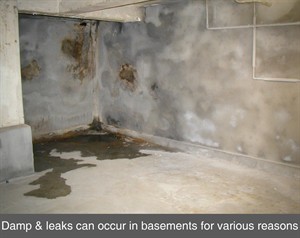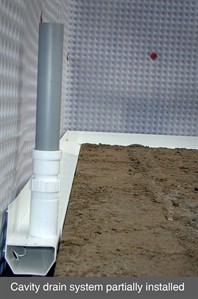Existing Basement Waterproofing
 Historic or modern basements can often
exhibit dampness, or seepage, due to defective or missing
waterproof systems; manifesting as tidemarks on damp masonry or
plaster, or even free flowing water. Older, historic buildings
generally wouldn't have had a basement waterproof system installed,
whereas more recent builds would generally have a tanking or
waterproof membrane system installed, which has since failed.
Historic or modern basements can often
exhibit dampness, or seepage, due to defective or missing
waterproof systems; manifesting as tidemarks on damp masonry or
plaster, or even free flowing water. Older, historic buildings
generally wouldn't have had a basement waterproof system installed,
whereas more recent builds would generally have a tanking or
waterproof membrane system installed, which has since failed.
At Stronghold Preservation, we would carry out a survey to
assess the basement, and make proposals as to the most preferable
solution to achieve a dry basement. We provide a 10 year
insurance backed guarantee for all basement waterproofing where we
have provided the design detail, and installed the basement
waterproofing system.
When deciding on the best option to waterproof an existing
basement, the options can be put into three categories:
- A
barrier system, which will hold back the water
- A cavity
drain system which will manage and expel any water ingress
- Leak sealing repair system;
used generally in waterproof concrete constructions.
Waterproof Barrier Systems
Traditional 'Tanking' would fall into this category. A
waterproof internal (or external, if existing) membrane is bonded
to the basement structure to prevent water ingress into the
internal environment; eg bonded sheet membranes, cementitious
tanking, bentonite matting. To be completely successful in
providing a dry basement, the workmanship needs to be defect free,
which, according to BS8102, is very difficult to achieve,
especially where the work has been carried out by non-waterproofing
specialists. If the barrier is compromised (for example,
punctured by a nail or tears due to movement in the retaining
wall), then the barrier becomes ineffective at holding back the
water, causing a damp basement. Our experienced surveyors
will assess your basement and design the most suitable system for
your basement, to meet your specific needs. The existing
basement may already have a barrier type waterproofing system,
either internally, or externally, which may have failed, resulting
in the damp.
Cavity Drain Basement Waterproofing System
Cavity drain systems manage
any water which may penetrate through the retaining wall, diverting
the water away from the internal environment. A drain is
installed internally at the base of the existing basement retaining
wall, and a membrane fixed to the existing walls. Any water
passing through the retaining wall drips into the drain, before
being moved, by pump or gravity, into the existing storm
drainage. The floor also needs to have a waterproof
membrane. This system is suitable for use in concrete or
masonry basement walls; existing or new build.
Leak Sealing Repair System
Stronghold Preservation also use an innovative leak
sealing system for dealing with damp in existing basements;
though it may not be suitable for all basement damp problems.
Therefore it is imperative that one of our knowledgeable
surveyors assess the basement to advise on the most suitable
solution. Leak sealing uses a resin, which is pumped into the
retaining wall via pre-drilled holes, until the leak is sealed; our
trained technicians can instantly recongise when the leak has been
effectively sealed. This leak sealing system is often used in
underground car parks, lift pits and underground plant rooms.
Stronghold also provide a service duct sealing
service, to prevent water ingress through the ducts.